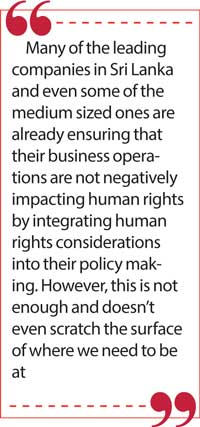Friday Feb 20, 2026
Friday Feb 20, 2026
Tuesday, 10 August 2021 02:48 - - {{hitsCtrl.values.hits}}

Anisha Rajapakse
When Sri Lanka regained the GSP+ trade concessions to the EU, exporters from a range of sectors got a renewed opportunity to compete in this lucrative market. Yet, prospects for future growth will rely on Sri Lanka boosting its sustainability and governance credentials, to position exports more strongly, for the longer term. In this interview for the Centre for a Smart Future, Anisha Rajapakse explores key issues for Sri Lanka in strengthening its positioning as a trusted and preferred sourcing location for EU buyers. Anisha is a senior global expert with over two decades of experience working at the intersection of business, human rights, and international development. She was formerly with the Foreign Trade Association in Brussels and was recently appointed to the global Board of the Rainforest Alliance. Following are excerpts:
 By Anushka Wijesinha
By Anushka Wijesinha
Q: Anisha, let’s start off with the most recent and crucial development – the EU Parliament’s resolution on Sri Lanka and urging the EU Commission to consider temporary withdrawal of GSP+ trade concessions. You were based in Brussels for many years, as part of the Foreign Trade Association. From your experience, how serious is this latest development for Sri Lanka, and our export prospects to the EU
To be clear, this EU resolution on Sri Lanka isn’t an immediate call for the implementation of action to revoke GSP+ as compared to the tougher stance taken against the Philippines and Pakistan. We are at the stage in which the Commission and the European External Action Service (EEAS) are using the GSP+ as a leverage by highlighting the need for advancement on Sri Lanka’s human rights obligations. The last resort would be to initiate a procedure for the temporary withdrawal of Sri Lanka’s GSP+ status. We can still take steps to respond positively and robustly to retain this facility.
Any withdrawal could be a challenging prospect to the garments and fisheries industries that are direct beneficiaries of the GSP+ concessions, as well as the ceramics and rubber industries. It’s not the best timing given that we’ve just been wracked by a devastating third wave of the COVID-19 pandemic and a fourth more destructive wave being predicted. It would be a shame to lose this key concession as it would undoubtedly lead to job losses, affect the country’s competitiveness in global markets and impact its foreign exchange earnings.
It was only in 2017 that we regained GSP+ after it was revoked in 2010. We also need to be wary of a potential domino effect with the USA and UK following suit – given that these two countries were also supporters of the recent UNHRC Resolution against Sri Lanka. At the same time, we should not discount the fact that Sri Lanka could also lose out to regional apparel players such as India and Bangladesh given their lower production costs in comparison to Sri Lanka.
 |
 |
 |
 |
Q: There are folks who believe that countries that offer unilateral trade concessions to Sri Lanka shouldn’t make requirements in return. What are your views on this, in the context of GSP+?
The GSP+ scheme is conditional on Sri Lanka advancing human and labour rights and working towards sustainable development. It’s granted on the condition of Sri Lanka’s commitment to ratify and effectively implement 27 international conventions on human rights, labour conditions, protection of the environment and good governance.
What we must remember is that adhering to basic human rights as a conditionality to receiving GSP+ isn’t anything new and not a surprise. The expressed concerns from the EU have only pointed out the instances where Sri Lanka has deviated from the agreed norms as it has been consistently monitoring the implementation of the GSP+ concession to Sri Lanka and the repeal of the Prevention of Terrorism Act (PTA) and the implementation of the 27 international conventions, including on human rights. At the risk of sounding simplistic, I can only say that we can continue to retain this concession just by ensuring the rights of people. Surely that isn’t a big ask? Also, these conditionalities are not against Sri Lanka either as an individual nation or as an association. These are very much aligned to the goals and values that form the basis of their mandate.
Exports to the EU have risen to 2.3 billion euros, making the EU Sri Lanka’s second-largest export market. I recently read that we are likely to lose our competitive edge and risks US580 million worth of exports within a year if the GSP+ concessions are withdrawn. Every two years a GSP+ EU monitoring mission visits Sri Lanka, and the last mission took place in September 2019.
Subject to any COVID-19 restrictions a delegation is expected to be in Sri Lanka in September. I do believe that the Government will address their concerns in a responsive and constructive manner and further strengthen existing bilateral and trade relations.
Q: Would you agree, though, that we need to look beyond the GSP+ and position ourselves for a post-GSP future, where Sri Lanka focuses on sustainability to derive a competitive edge? What aspects of that positioning would be priorities, in your view?
While it’s good to aspire to end dependency on trade concessions and diversify our exports beyond the EU, it’s easier said than done. GSP+ facility facilitates a significant economic boost for Sri Lanka. Having said this, I certainly agree that we need to prepare in any case for a post GSP+ scenario when Sri Lanka will be graduating from the GSP scheme in 2023 – or until there is a reclassification of the country to an upper middle-income country. Sectors that are currently benefiting from the concession will be compelled to trade on standard trade terms – i.e. continue on standard WTO terms.
Notwithstanding the pandemic, making trade and supply chains sustainable and resilient is a priority even more now than it was before. Today the private sector the world over is at its most critical juncture towards a resilient and sustainable recovery in 2021 that considers purpose as well as profit. Like other countries, Sri Lanka is adjusting to the continuing economic fallout of the pandemic. Whether we have the GSP+ concession or not, our supply chains need to be improved and recalibrated towards ensuring greater transparency and continue to prioritise human rights and environmental due diligence throughout value and supply chains to stay ahead of the curve. We need to keep in mind that increasingly more and more investors are recognising that human rights violations pose a financial and reputational risk, as well as being morally and ethically wrong
Q: There is a heightened competitiveness in the world today, especially among countries looking to capitalise on the consumption boost in the West following the ending of COVID-19 related restrictions with the vaccine being rolled out. What are some of the key trends and priorities Sri Lankan exporters should focus on, to remain competitive in this landscape?
Expectations for responsible business have intensified over the past 10 years as we’re seeing recent international developments in this area. At the same time consumer sentiment in the West is accelerating towards ethically and sustainably sourced and manufactured high quality goods for which they are ready to pay a premium price. This is a tremendous opportunity for local exporters to capitalise on. While businesses need to be profitable to survive and thrive, it must be done by doing the right thing – by respecting people and the planet, by ethical behaviour, by respecting human rights and stakeholder interests, and by being transparent and accountable. Exporters can stay competitive by producing high quality and ethically produced goods.
Many of the leading companies in Sri Lanka and even some of the medium sized ones are already ensuring that their business operations are not negatively impacting human rights by integrating human rights considerations into their policy making. However, this is not enough and doesn’t even scratch the surface of where we need to be at. If Sri Lanka is to get ahead in the global market and attract new investments and buyers, adoption of sustainability and responsible business practices cannot be just limited to a few of the larger companies. Investors today opt for sustainable investments rather than a lucrative business that could get shut down tomorrow due to human rights violations or corruption.
Q: How does Sri Lanka stack up against peers and competitors in sustainable supply chains and sustainable manufacturing? Have we done enough to showcase what we do well?
Sri Lanka certainly remains better placed when it comes to sustainable supply chains vis-à-vis other regional players such as Bangladesh, Vietnam, and Cambodia that are also benefiting from trade preferences, and other countries such as India, Pakistan, and Nepal. Where Sri Lanka can stay ahead of the competition is due to incidences such as child labour, sexual violence, and abuse of women in supply chains, and forced labour and other supply chain violations being largely absent in its supply chains.
The majority of Sri Lankan companies, whether it is a SME or a multinational, for the most part already prioritises respect for human rights as a business imperative. If we specifically take child labour for example, in comparison to other countries in the region, Sri Lanka has a low incidence of involvement of children in labour and strong legal frameworks that discourages child labour. The most common incidences are sometimes found in small scale industries in rural areas. Sri Lanka has pledged to end Worst Forms of Child Labour by year 2022 and to Eliminate Child Labour by 2025. One of the main reasons as to why Sri Lanka has established strong partnerships with well reputed apparel brands in the West is due to the confidence, they have that Sri Lankan companies’ maintain high standards when it comes to ensuring that labour standards are met.
I am confident that in any comparative analysis of ethical production by suppliers in Sri Lanka vis-à-vis other countries in Asia and in many countries of the so-called ‘developed’ regions, Sri Lanka would undoubtedly be in the top five ranking countries. Sadly, in Sri Lanka we haven’t been proactive enough to amplify our comparative strength and market leverage even though many Lankan companies have been literally ‘doing the right thing’ and been leading the way in sustainable and ethical business practices for a very long time. Our country is widely recognised as a low-risk sourcing destination, and we need to sustain that reputation to stay ahead in terms of attracting new investments.
(Anushka Wijesinha is an economist and international consultant. He is the co-founder of the Centre for a Smart Future. [email protected])
Centre for a Smart Future is a Asia-centric think tank set up to foster fresh and independent thinking on development issues among young professionals, driven by interdisciplinary, contemporary, and solutions-oriented approaches. CSF is based out of Colombo, with a network of practitioners, researchers, and policy professionals across the world. www.csf-asia.org.